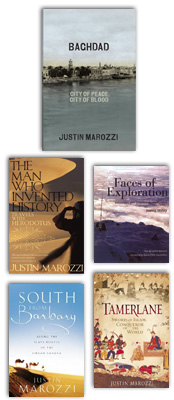“They’ve done what?”
My colleague P looked aghast. Instantly haggard. Crushed. Ruined. He’d aged years in seconds. His eyes were wide as saucers.
“They’ve said they’re not going to supply us with any food anymore,” I replied. “We’ve got to make our own arrangements.”
There followed a string of expletives which suggested that P had not altogether lost his marbles. But he was still fixing me with a wild-eyed stare that was not encouraging.
The conversation took place after the best part of two months subsisting on goat, camel and rice. I had managed to get a daily piece of fish, always a godsend. P, working in a different office, hadn’t. Fruit had long since become a rarity, vegetables had vanished. Bread was an elusive, unspoken-of luxury.
In a flash I thought of the small band of British Army officers marooned in remote desert outposts across Somalia during the Second World War. Surrounded by endlessly feuding tribes bent on bloodshed, deprived of all but the most basic supplies, isolated for months at a time in thousands of miles of ferocious wilderness, hollowed out by solitude, harassed by malarial fevers, broken by introspection and desiccated by the African sun, a number of them had eventually succumbed to mental disintegration, raised a pistol to their temple and blown their head off.
I didn’t think P was going to do that. For a start he didn’t have a pistol.
Warriors tells the little known story of these hardy officers and the hardier Somali nomads among whom they soldiered. Written by Gerald Hanley, a tough Irishman who was one of the most resilient of their number, it chronicles their astonishingly testing tours and the harsh lives of the wandering Somali warriors. Hanley also offers an alternately humorous and disturbing examination of the psychological effects of prolonged cultural dislocation, isolation and wilderness.
Food supplies, or rather the lack of them, are often uppermost in his thoughts. Somalia shrinks into a “blazing yellow coast on which one… thirsted and yearned, and dreamed of onions and salad and bread and beer, and even of drinkable, living water.” A relentless diet of army rations, biscuits and bully beef, camel and goat when those have run out, do little to sustain morale or mental equilibrium. “We used to talk about lettuce and beetroot and fresh eggs in increasingly burning and passionate words,” he writes. “Nobody could remain sane in that arid world.” Distant Mogadishu, “headquarters of the vast insane asylum we had been lost in”, becomes an almost mythical oasis for R&R: women, bars, cold beer, fresh food, clean sheets.
I looked at P again. He was a broken man. Speechless. Immobile.
“It’s going to be all right. I’ll call Ahmed,” I said. This was Mogadishu’s best-known restaurateur, a charismatic Somali-Brit who had opened a number of restaurants and hotels and had weathered a number of recent terrorist attacks by Al Shebab suicide bombers.
Some of this was my fault. Lost in my own tortured reveries about food, during the past few days I had emailed P a series of photographs as a joke: petits fours from the restaurant at Chateau Smith Haut Lafitte, memories of a foray in Bordeaux last summer. Then there was a Full English Breakfast or two, a Caesar Salad, lamb chops, seared tuna and a particularly succulent venison casserole. It probably wasn’t a good idea, but it felt harmless at the time.
Years earlier, during an expedition in Libya with a friend, when our daily diet had diminished to tuna fish pasta and dates, conversations had often turned to imaginary feasts. Sometimes this sustained morale for a few minutes, at others it plunged us into silent moroseness.
In The Lost Oases, the high-spirited Ahmed Hassanein Bey, one of my favourite desert explorers, wrote hilariously of these epicurean cravings while travelling by camel across the Saharan wastes in 1923.
“As I stride along I imagine myself in Shepherd’s Grill Room in Cairo and I order Crevettes a l’Américaine with that subtle variation of Riz a l’orientale which is a speciality of the house. Or I am at Prunier’s in Paris ordering Marennes Vertes d’Ostende, followed by a steak and soufflé. Perhaps it is the Cova at Milan and a succulent dish of Risotto alla Milanese; maybe Strawberries Melba at the Ritz in London.”
These fond dreams were cruelly interrupted by the arrival of a tribesman bringing him a handful of wizened dates. Like Hanley, Hassanein Bey, an Egyptian scholar, spy, writer and Olympic fencer, was not a man to be unduly perturbed by hardship. He fitted out one of his camels with a tent to rest under out of the pitiless sun. It was quickly nicknamed “the Club”. Among his retainers “The Bey is lunching at the Club today” became a morale-boosting refrain.
“Don’t worry. We’ll sort something out,” I continued. “Ahmed can start bringing us some fresh food. It’ll be fine.”
There was a loud knock at the door. In came the ever cheerful Hersi, a slim young man carrying a pot. I looked at it with a demoniacal glare. What would it contain this evening? Surely some fresh fish at last? With trepidation and a heavy heart I opened it. A few scraps of fatty goat meat clung dispiritedly to a giant chunk of bone forlornly mounted on a mound of rice.
I smiled weakly at P.
“Dinner’s here,” I said. “It looks delicious.”
Warriors: Life and Death among the Somalis by Gerald Hanley is published by Eland Books

